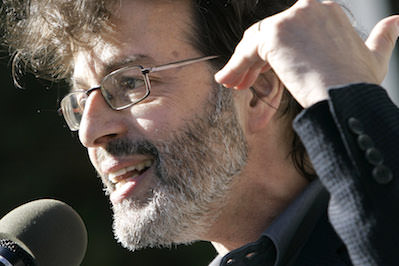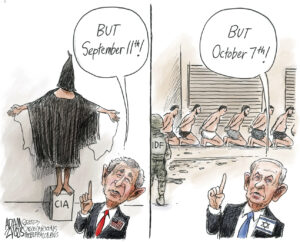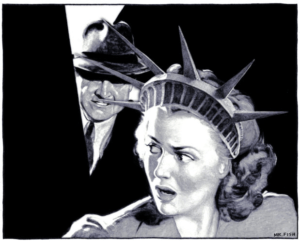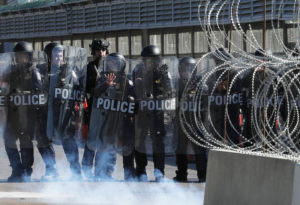Truthdiggers of the Week: Critics of the American Psychological Association Role in Torture Program
Health care professionals and human rights experts have blown the whistle on the American Psychological Association for providing the US with ethical and legal cover for torture of terrorism suspects .

Dr. Steven Reisner speaks at a 2007 rally in San Francisco to protest the participation of the American Psychological Association in military interrogations at Guantanamo Bay. (AP / Jeff Chiu)
Every week the Truthdig editorial staff selects a Truthdigger of the Week, a group or person worthy of recognition for speaking truth to power, breaking the story or blowing the whistle. It is not a lifetime achievement award. Rather, we’re looking for newsmakers whose actions in a given week are worth celebrating.
Because they deal with human nature, the social sciences are indispensable to the effort to develop institutions and standards of behavior that are healthy, sustainable and just. It is especially disheartening, then, when their credentialed practitioners use their knowledge and priveleged positions to help leaders in government betray the people they are supposed to serve.
Here’s the general thrust of a report from a group of health care professionals and human rights experts: The American Psychological Association collaborated with the George W. Bush administration to provide ethical and legal cover for elements of the U.S. government torturing prisoners in the post-9/11 “war on terror.”
“The A.P.A. secretly coordinated with officials from the C.I.A., White House and the Department of Defense to create an A.P.A. ethics policy on national security interrogations which comported with then-classified legal guidance authorizing the C.I.A. torture program,” the authors wrote.
The lead authors of the report are longtime critics of the professional organization. Stephen Soldz is a clinical psychologist and professor at the Boston Graduate School of Psychoanalysis. Steven Reisner is a clinical psychologist and founding member of the Coalition for an Ethical Psychology. Nathaniel Raymond is director of the Signal Program on Human Security and Technology at the Harvard Humanitarian Initiative and former director of the campaign against torture at Physicians for Human Rights.
Their report is the first to examine the APA’s role in the interrogation program. It cites newly disclosed emails that show the association’s effort to involve psychologists in the program. (At least some of the messages were recovered from an email account that belonged to a behavioral science researcher who died in 2008.) These were sent at about the time Bush administration officials were working to contain the damage done to the program’s public image when graphic photos of prisoner abuse at the U.S. military’s prison at Abu Ghraib in Iraq came to light in 2004. The Justice Department used the involvement of these psychologists to argue in secret memos that, because the professionals were present and monitoring the activity, the program was legal and did not constitute torture.
Of course, the American Psychological Association denied that it had coordinated its actions with the government. Association spokeswoman Rhea Farberman was quoted in a New York Times article by journalist James Risen on the report as saying there “has never been any coordination between A.P.A. and the Bush administration on how A.P.A. responded to the controversies about the role of psychologists in the interrogations program.”
Contradicting this claim is a 2003 email, cited in Soldz, Reisner and Raymond’s report, from a senior psychologist at the CIA to a senior official at the APA. In the email, the CIA psychologist appears to confide in the APA official about the work of two psychologists whom the CIA privately contracted with to develop and help run “enhanced interrogations” at the CIA’s secret prisons around the globe. In language that could make one’s skin crawl, the CIA psychologist explains to the association official that the contractors “are doing special things to special people in special places.” (The contractors — James Mitchell and Bruce Jessen — and their work became widely known when the U.S. Senate Intelligence Committee released its landmark report on CIA torture in December 2014.)
Underscoring the extent of the collaboration, Soldz said in an email quoted by the Times, “In 2004 and 2005 the C.I.A. torture program was threatened from within and outside the Bush administration. … Like clockwork, the A.P.A. directly addressed legal threats at every critical juncture facing the senior intelligence officials at the heart of the program. In some cases the A.P.A. even allowed these same Bush officials to actually help write the association’s policies.”
In its article on the report, the Times described the psychologists and human rights experts who wrote the document as “dissidents.” It is—again—disheartening that the people pushing our leaders to respect and adhere to a universally accepted standard of ethics are the dissidents in such a dispute. Ironically, it is social science itself that shows us how a desire to fit in, do well and get along can lead members of any institution—social science departments in universities and professional associations included—to violate the values purported to define their purpose within the human community.
Fortunately for this community, critics sometimes step forward to challenge the tendency. Among them are Stephen Soldz, Steven Reisner, Nathaniel Raymond and the coauthors of their paper—our Truthdiggers of the Week.
Independent journalism is under threat and overshadowed by heavily funded mainstream media.
You can help level the playing field. Become a member.
Your tax-deductible contribution keeps us digging beneath the headlines to give you thought-provoking, investigative reporting and analysis that unearths what's really happening- without compromise.
Give today to support our courageous, independent journalists.






You need to be a supporter to comment.
There are currently no responses to this article.
Be the first to respond.